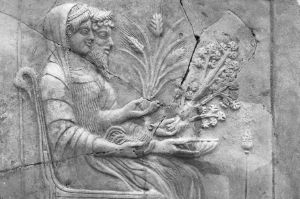Concert
Rundfunk-Sinfonieorchester Berlin
Vladimir Jurowski, conductor
Xenakis II | Bartók | Mahler

The gods Hades and Persephone as princes of the underworld, terracotta relief, 5th century BC. © De Agostini Editorial / getty images
“A dual creature of life and death,” is how Iannis Xenakis described humanity. His orchestral work “Aïs”, programmed here by the Rundfunk-Sinfonieorchester Berlin under Vladimir Jurowski uses texts from Homer’s “Iliad” and “Odyssey” to highlight the moment when all life comes to an end. Even the love that can be heard in Béla Bartók’s First Violin Concerto remains fleeting. The concert concludes with Gustav Mahler’s Fifth Symphony.
Media vita in morte sumus: the finite nature of life was omnipresent in the thinking of Iannis Xenakis – as a memory of his own brush with death while fighting with Greek partisans on 1 January 1945 when the composer suffered a severe facial injury and lost his left eye. The works which refer to this experience include the orchestral piece written in response to a commission from Bayerische Rundfunk’s musica viva, “Aïs” (Hades), in which the texts that are set from Homer’s “Odyssey” and “Iliad” concern the irrevocability of death. At the same time, Xenakis, whose 100th anniversary will be celebrated in 2022, mentions Attic grave steles from the 5th and 4th centuries B.C. on which a “gentle, melancholy, smile of goodbye links those who are already dead to the living – themselves future shadows”: The music plays around “the feelings and sensations of this double creature of life and death which bears the name ‘human’ and whose existence is inextricably linked with these feelings and sensations.” The Rundfunk-Sinfonieorchester Berlin and Vladimir Jurowski begin this concert with Xenakis’ haunting lament, which is introduced by massive fanfares. These, presented “rather fleetingly, in the manner of military fanfares” can also be found in Gustav Mahler’s Fifth Symphony, which every listener around 1900 would have associated with the army of the Austro-Hungarian Empire on the march. The programme also includes Bartók’s First Violin Concerto, composed “as if in a narcotic dream”, which was written with late Romantic emphasis as a declaration of love for the young violinist Stefi Geyer.
Concert Programme
Iannis Xenakis (1922 – 2001)
Aïs
for baritone, percussion and orchestra (1980)
Béla Bartók (1881 – 1945)
Concerto for Violin and Orchestra No. 1 (1907/08)
Gustav Mahler (1860 – 1911)
Symphony No. 5 in C sharp minor (1901 – 1904/1911)
Cast
Georg Nigl – baritone
Dirk Rothbrust – percussion
Vilde Frang – violin
Rundfunk-Sinfonieorchester Berlin
Vladimir Jurowski – conductor
A Rundfunk-Sinfonieorchester Berlin event in cooperation with Berliner Festspiele / Musikfest Berlin